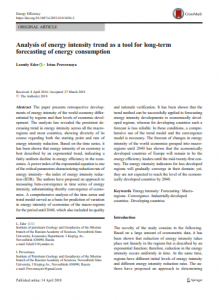Full Title: Analysis of energy intensity trend as a tool for long-term forecasting of energy consumption
Author(s): Leontiy Eder & Irina Provornaya
Publisher(s): Springer Netherlands
Publication Date: March 1, 2018
Full Text: Download Resource
Description (excerpt):
The paper presents retrospective developments of energy intensity of the world economy differentiated by regions and their levels of economic development. The analysis has revealed the persistent decreasing trend in energy intensity across all the macro-regions and most countries, showing diversity of its course regarding both the starting point and rate of energy intensity reduction. Based on the time series, it has been shown that energy intensity of an economy is best described by an exponential trend, indicating a fairly uniform decline in energy efficiency in the economies. A power index of the exponential equation is one of the critical parameters characterizing reduction rate of energy intensity—the index of energy intensity reduction (IEIR). The authors have proposed an approach to measuring beta-convergence in time series of energy intensity, substantiating thereby convergence of economies. A comprehensive analysis of the time series and trend model served as a basis for prediction of variation in energy intensity of economies of the macro-regions for the period until 2040, which also included its quality and rationale verification. It has been shown that the trend method can be successfully applied to forecasting energy intensity developments to economically developed regions, whereas for developing countries such a forecast is less reliable. In these conditions, a comprehensive use of the trend model and the convergence model is necessary. The forecast of changes in energy intensity of the world economies grouped into macro-regions until 2040 has shown that the economically developed countries of Europe will remain to be the energy efficiency leaders until the mid-twenty-first century. The energy intensity indicators for less developed regions will gradually converge in their domain; yet, they are not expected to reach the level of the economically developed countries by 2040.
